Review
With its new SUV coupé, Renault is vowing to storm the D-segment citadel, dominated for so long by the German premium competition.
The French manufacturer is really not joking when it insists those used to driving its European competitors to “ditch the Deutsche”.
It came up with the Rafale E-Tech full hybrid 200 hp.
At launch, Renault chief Luca de Meo said Renault was stepping up to the mark “with everything that was lacking before: a vehicle positioned in the buoyant SUV coupé segment, a powertrain in tune with its times, brand excellence in technology and design, and also a real sense of emotion”.
Named after a celebrated 1930s racing aircraft, the manufacturer hopes to infuse some of that storied heritage in to its latest automotive offering – the Rafale, its new flagship vehicle.
It has in fact managed to tick many of the boxes on De Meo’s wishlist offering performance that displays superior engineering and an aesthetic that is both refined and practical, designed with thought for its occupants.
Equipped with a full hybrid engine, the Rafale’s natural competitors will be the likes of the Citroën C5 X and Peugeot 408 and could even give premium rivals such as the Audi Q3 Sportback and BMW X2 a run for their money.
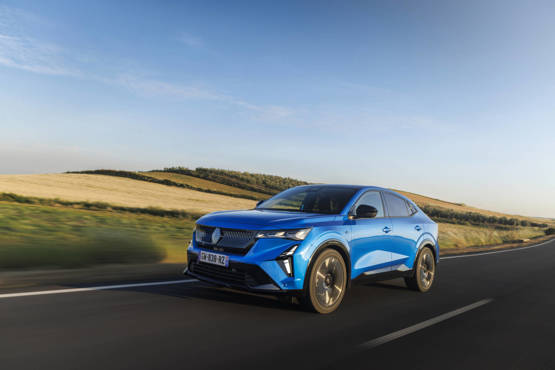
The first two versions of the Renault Rafale launching this month are powered by the E-Tech Full Hybrid 200 engine, combining a 1.2-litre turbocharged engine with a 50kW and smaller 25kW motor for the engine starter alongside a 2kWh electric battery. The CO2 on that car is 105g/km.
This hybrid system delivers a 0-62mph time of 8.9 seconds. A less sporty Techno model should be arriving late summer and the plug-in hybrid (PHEV) is due to arrive on these shores by autumn.
The forthcoming meatier 300hp PHEV version is something which Renault executives really do think will help their new model to gain a competitive advantage as part of its D segment entry.
The 300 hp E-Tech 4x4 plug-in hybrid powertrain adds a new electric motor to the rear axle for more power and permanent four-wheel drive mode. Prices and performance for this have yet to be released but its performance is of pioneer-grade. More of that later...
Returning to the E-Tech Full Hybrid 200 engine variant, the entry level price for the Techno Esprit Alpine comes in at £38,195 which gets the customer some 20in alloy wheels, matrix LED headlights, dual-zone climate control, heated front seats and steering wheel, a powered tailgate and parking aids.
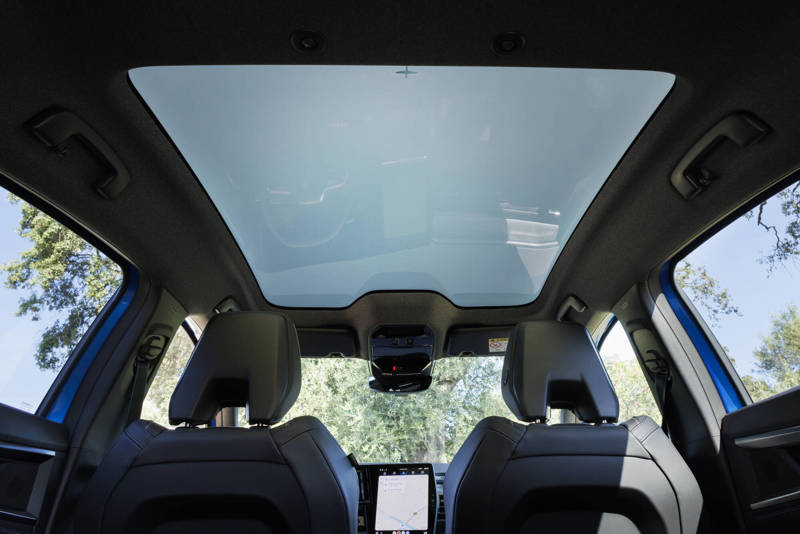 For this test drive, AM opted for the Iconic Esprit Alpine which has a high-end 12 speaker Harman Kardon audio system and built-in Google, 360-degree 3D camera views and hands- free parking, plus emergency lane-keeping assist, traffic-sign recognition, automatic emergency braking (AEB), blind-spot monitoring and driver awareness systems – all of which will comes for £44,695.
For this test drive, AM opted for the Iconic Esprit Alpine which has a high-end 12 speaker Harman Kardon audio system and built-in Google, 360-degree 3D camera views and hands- free parking, plus emergency lane-keeping assist, traffic-sign recognition, automatic emergency braking (AEB), blind-spot monitoring and driver awareness systems – all of which will comes for £44,695.
Four-wheel steering and the impressive Solarbay opacifying panoramic sunroof come as standard on both of these launch versions.
Four-wheel steering is a premium-level innovation where the rear wheels turn in the opposite direction when manoeuvring at slow speed. This makes it well suited to city driving where the tighter turning radius makes urban tight corners light work.
At high speeds the rear wheels turn in the same direction to improve stability, although at higher speeds we found that handling was not quite as assured when negotiating long sweeping bends. Time will tell whether this added engineering complexity eventually drives up maintenance costs.
The four-wheel steering system combined with 20in alloy wheels makes for a ride which is on the firm side though and correcting speed adequately for negotiating road surface inconsistency is something which needs to be accounted for. It will be interesting to see if the less sporty Techno version’s suspension which dispenses with four-wheel steering will prove a little more forgiving.
Engine noise is low as is wind and road noise which allowed the cabin infotainment which features a 12.3in digital driver display and a 12.0in portrait-oriented touchscreen to come into its own.
 Designed for the driver, on-screen controls were navigable and offered easy-to-find features like DAB radio, Bluetooth, Android Auto, Apple CarPlay and Google Maps while physical climate control knobs dispened with the need for fumbling while en route.
Designed for the driver, on-screen controls were navigable and offered easy-to-find features like DAB radio, Bluetooth, Android Auto, Apple CarPlay and Google Maps while physical climate control knobs dispened with the need for fumbling while en route.
The interior is plush with good quality coverings and Alcantara panels and the six-way electric adjustments make the front sports seats with their lumbar support accommodating, certainly on longer journeys.
Another innovation that sales executives must demonstrate, this time for the rear seated passengers, is the Renault ‘ingenius’ armrest positioned centrally and equipped with two USB-C ports, cupholders, device holders and carpeted trays.
 Despite the coupé roofline, the Rafale’s 4.7m length guarantees ample cabin space both forward and in the rear where the seats are split 40/20/40. Boot space is an adequate 535 litres which can be expanded to 627 litres by lowering the floor.
Despite the coupé roofline, the Rafale’s 4.7m length guarantees ample cabin space both forward and in the rear where the seats are split 40/20/40. Boot space is an adequate 535 litres which can be expanded to 627 litres by lowering the floor.
 Guillaume Sicard, the outgoing chief executive of Renault Group UK who is to step up and assume leadership in the French market, said he is acutely aware of the challenge for a car maker entering a new segment – and for its dealership network too – which in the UK includes 140 retail points.
Guillaume Sicard, the outgoing chief executive of Renault Group UK who is to step up and assume leadership in the French market, said he is acutely aware of the challenge for a car maker entering a new segment – and for its dealership network too – which in the UK includes 140 retail points.
“It's going to be our biggest, most powerful car in terms of dimension and engine and the way we're going to support the dealer is to make sure that we offer a good launch campaign advertising and support.
“We’ll offer very good training as well to make sure that they keep on growing their understanding of all the technology - also in terms of the powertrain and how to sell the fuel consumption because we will be the best in the segment in terms of fuel consumption.”
“What I would ask our UK dealers - because it is a partnership - is to make sure that within their community they support Renault’s move to the D segment because we mainly sell B and C segment cars.
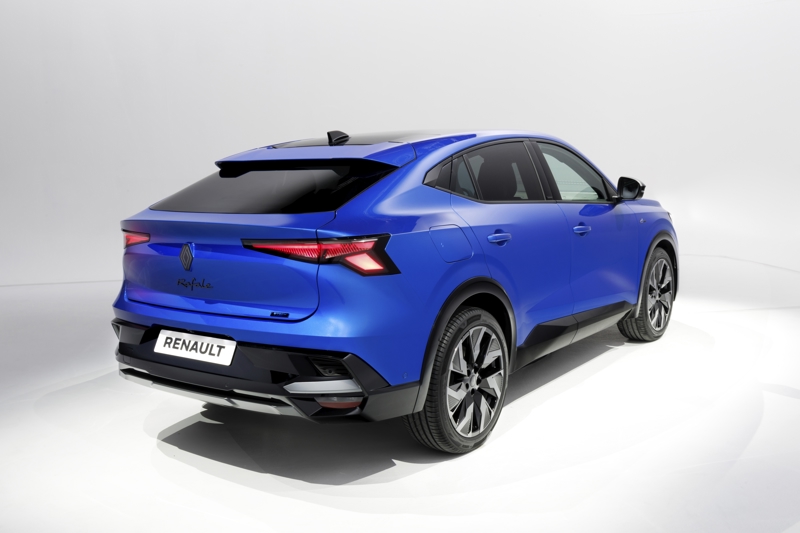 "It will require an effort from our dealers who should be proactive and tell those customers who may own a second D segment car - that while they are having their Clio or Captur being serviced - to have the Rafale for a day or two.”
"It will require an effort from our dealers who should be proactive and tell those customers who may own a second D segment car - that while they are having their Clio or Captur being serviced - to have the Rafale for a day or two.”
For Sicard, the arrival this autumn of the Rafale PHEV hybrid will steal the show in terms of performance and sales potential for the company car user chooser, due to its attractive 8% benefit in kind (BIK) rate.
“What counts for us is really not only the car itself, but also its total cost of ownership. This car, like the Austral, is pushing it even further, and the Austral is one of the benchmarks - if not the industry benchmark - in terms of fuel consumption.”
“If you compare it with a German car, it's obviously a very competitive price with very competitive technology.”
Author:
Aimee Turner
Deputy editor
AM deputy editor Aimée Turner has been a specialist B2B editor and journalist covering the international transportation sector for more than 20 years.
She has specialised in the significant safety, regulatory, and environmental issues that impact advanced technology businesses in the pursuit of more efficient, safer and sustainable transportation modes.

Factsheet
Price £38,195 - Techno Esprit Alpine / £44,695 - Iconic Esprit Alpine
Engine 1.2l Full Hybrid
Transmission Multi-mode clutchless automatic hybrid, front-wheel drive
Top speed 111 mph
0-62mph 8.9 secs
CO2 emissions 105 g/km

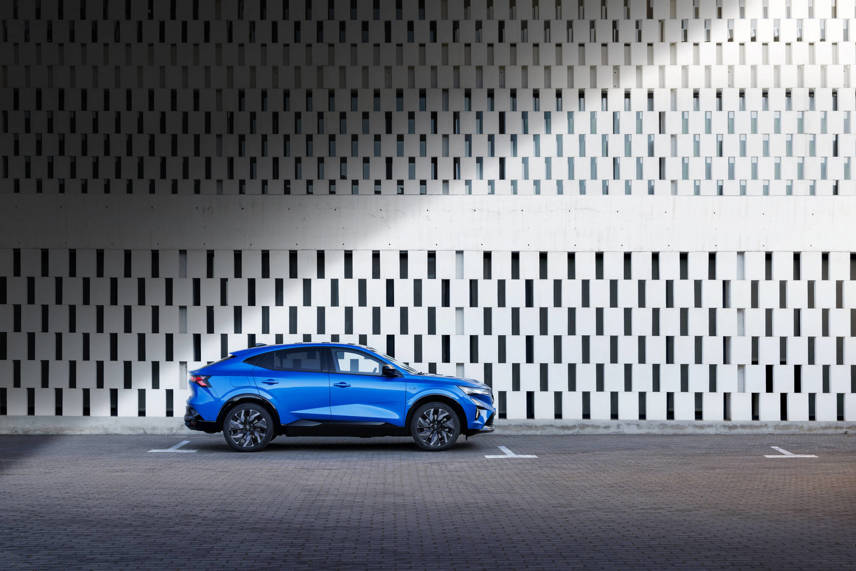

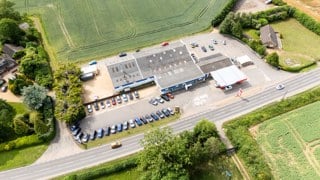

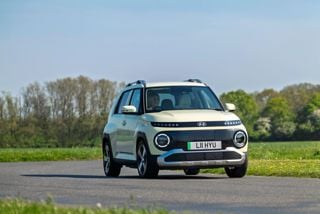
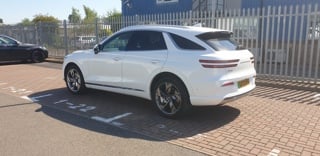












Login to comment
Comments
No comments have been made yet.